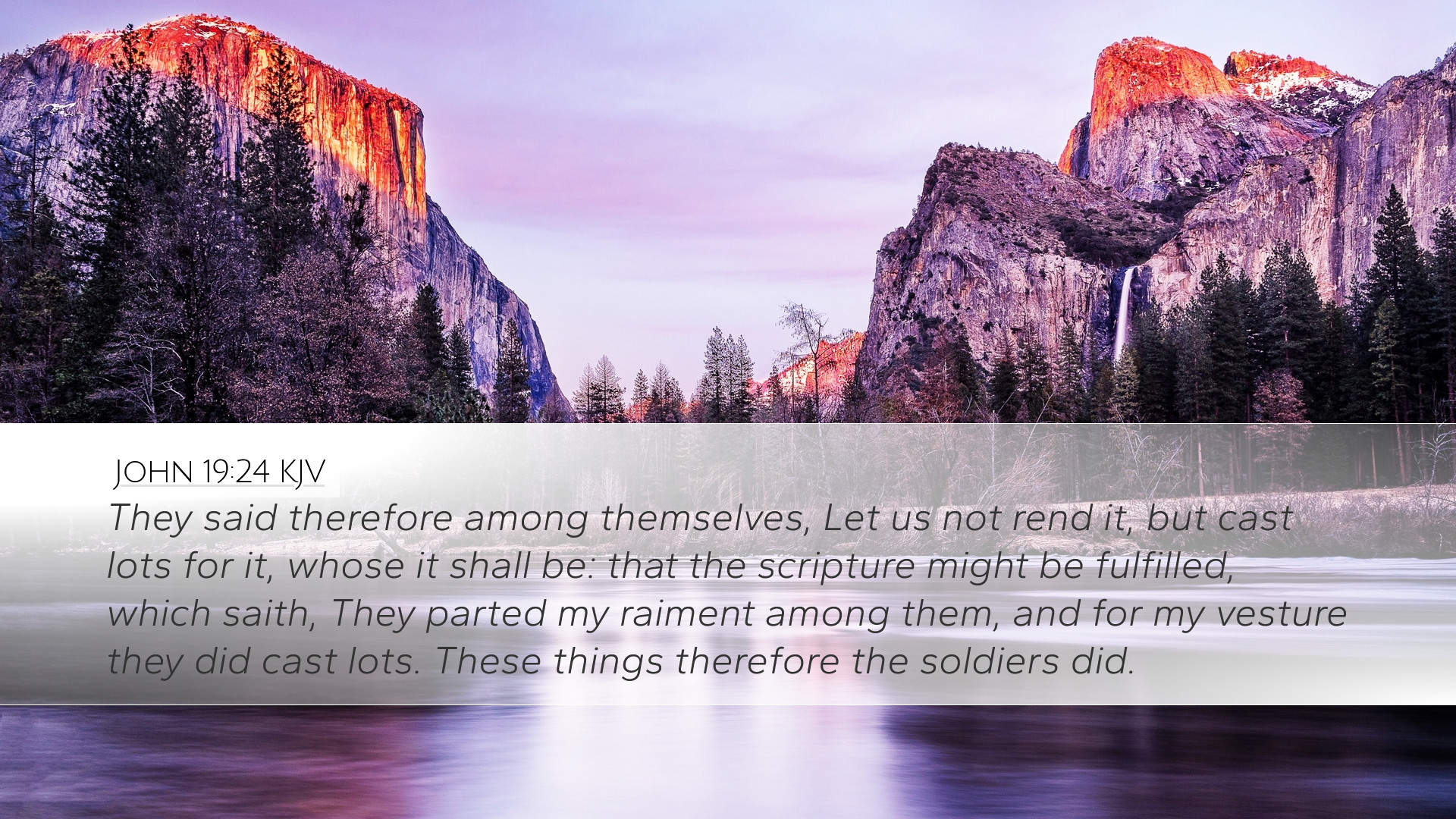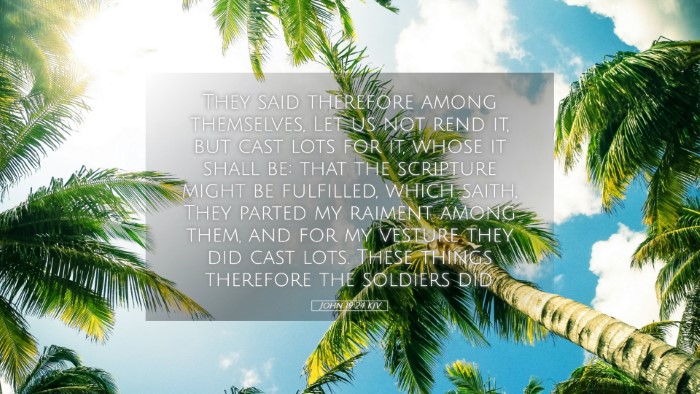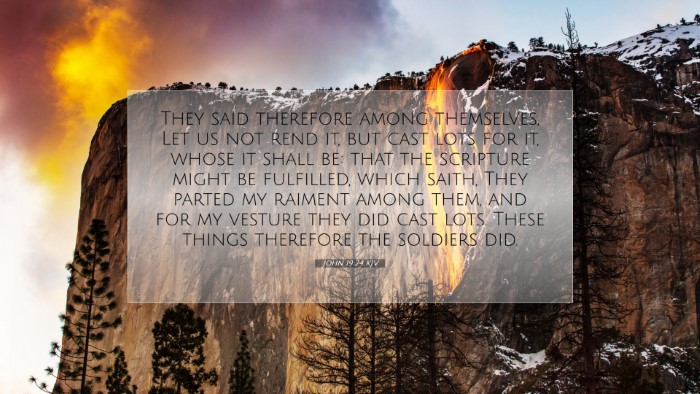Commentary on John 19:24
John 19:24 states: "They said therefore among themselves, Let us not rend it, but cast lots for it, whose it shall be: that the scripture might be fulfilled, which saith, They parted my raiment among them, and for my vesture they did cast lots." This verse is rich in theological and literary significance, providing insights into the fulfillment of prophecy, the character of Christ, and the nature of human choice in the face of divine decree.
General Context
The setting of John 19:24 is during the crucifixion of Jesus. It highlights the scene where the soldiers, dividing Jesus' garments, decide to cast lots for His seamless robe. This action is framed within the context of prophecy and serves as a poignant reminder of the Old Testament expectations regarding the Messiah.
Insights from Matthew Henry
Matthew Henry, a well-regarded biblical commentator, reflects on this passage by emphasizing the sovereignty of God and the fulfillment of prophecy. He notes that the decision of the soldiers to cast lots rather than tear the garment symbolizes the divine plan in chaotic circumstances. Henry connects this event to Psalm 22:18, which prophesies the division of the Messiah's garments. He posits that this fulfillment underscores Jesus as the true Messiah, aligning His suffering with prophecy.
- Divine Sovereignty: Henry underscores that God’s overarching plan is at work even in the acts of sinful men. The soldiers' actions fulfill Scripture, demonstrating that no human decisions can thwart God's purposes.
- Symbolism of the Garment: The seamless robe represents the unity and wholeness of Christ's ministry. By casting lots for it, the soldiers are unknowingly affirming His identity as the Messiah.
Insights from Albert Barnes
Albert Barnes provides a detailed analysis of the cultural and historical context of casting lots for garments. Barnes highlights that this practice was common among soldiers and reflects a contemporary method of allocation. He comments on the implications of this act, focusing on the indifference of the soldiers to the significance of their actions, as they treated the crucifixion with a lack of reverence, embodying the world's contempt for Christ.
- Estimation of Christ: Barnes argues that the soldiers' choice to gamble for the robe shows the profound tragedy of humanity’s rejection of the Savior, revealing their spiritual blindness.
- Prophetic Fulfillment: He emphasizes how John particularly points to the fulfillment of prophecy, indicating that the details of Jesus’ life and death were known beforehand, and they highlight God’s control over history.
Insights from Adam Clarke
Adam Clarke brings to light the theological implications of the casting of lots as it relates to divine providence. He examines the emotional and spiritual weight of Jesus’ crucifixion, noting that the act of the soldiers reflects a profound spiritual ignorance and a failure to grasp the significance of Christ's suffering. Clarke emphasizes that this incident exemplifies how even in moments of tragedy, God’s intentions are being realized, showcasing His redemptive plan for humanity.
- Reflection on Human Nature: Clarke notes that the soldiers' trivialization of Christ’s garments symbolizes the general disposition of humanity to overlook the significance of Christ’s sacrifice.
- Hope Amid Suffering: He encourages readers to see that through this act, God is revealing the depth of human depravity while simultaneously laying bare the pathway toward redemption.
Theological Reflections
The act of casting lots for Jesus' clothing encapsulates the tragic reality of human indifference to divine matters. In presuming to gamble over His possessions, the soldiers exemplified humanity's rejection of Christ. Yet, even amid this rejection, God's redemptive plan was being fulfilled. This duality invites profound theological reflection on the nature of sin and grace, emphasizing that God can bring about His purposes through human actions, however misguided.
Application for Pastors and Scholars
This passage calls pastors and scholars to reflect on the ways in which scripture is fulfilled in daily life, urging them not only to recognize prophecy but also to challenge congregations and students to consider the deeper implications of their relationship with Christ. It highlights the importance of discerning God’s sovereignty in the chaos of life and reminds believers of the profound significance of Christ’s sacrifice.
- Emphasis on Prophecy: Teach the importance of understanding the continuity of scripture and how Old Testament prophecies point to Christ.
- Human Response to Christ: Encourage congregations to examine their responses to Christ's work in their lives, warning against the indifference that characterized the soldiers.
- Hope in Despair: Preach that God's plans persist despite human failings, providing hope and assurance of His redemptive work.
Conclusion
John 19:24 serves as a poignant reminder of the complexity of Christ’s crucifixion and the fulfillment of prophetic scripture. The insights provided by biblical commentators like Matthew Henry, Albert Barnes, and Adam Clarke encourage deeper engagement with the text, urging a recognition of God’s sovereignty in human affairs. For pastors and theologians alike, this passage not only reflects the reality of Christ’s suffering but also challenges the believer to reflect on their response to His ultimate sacrifice.


